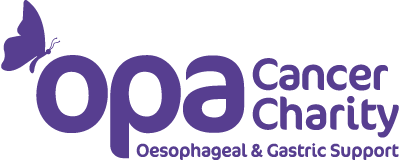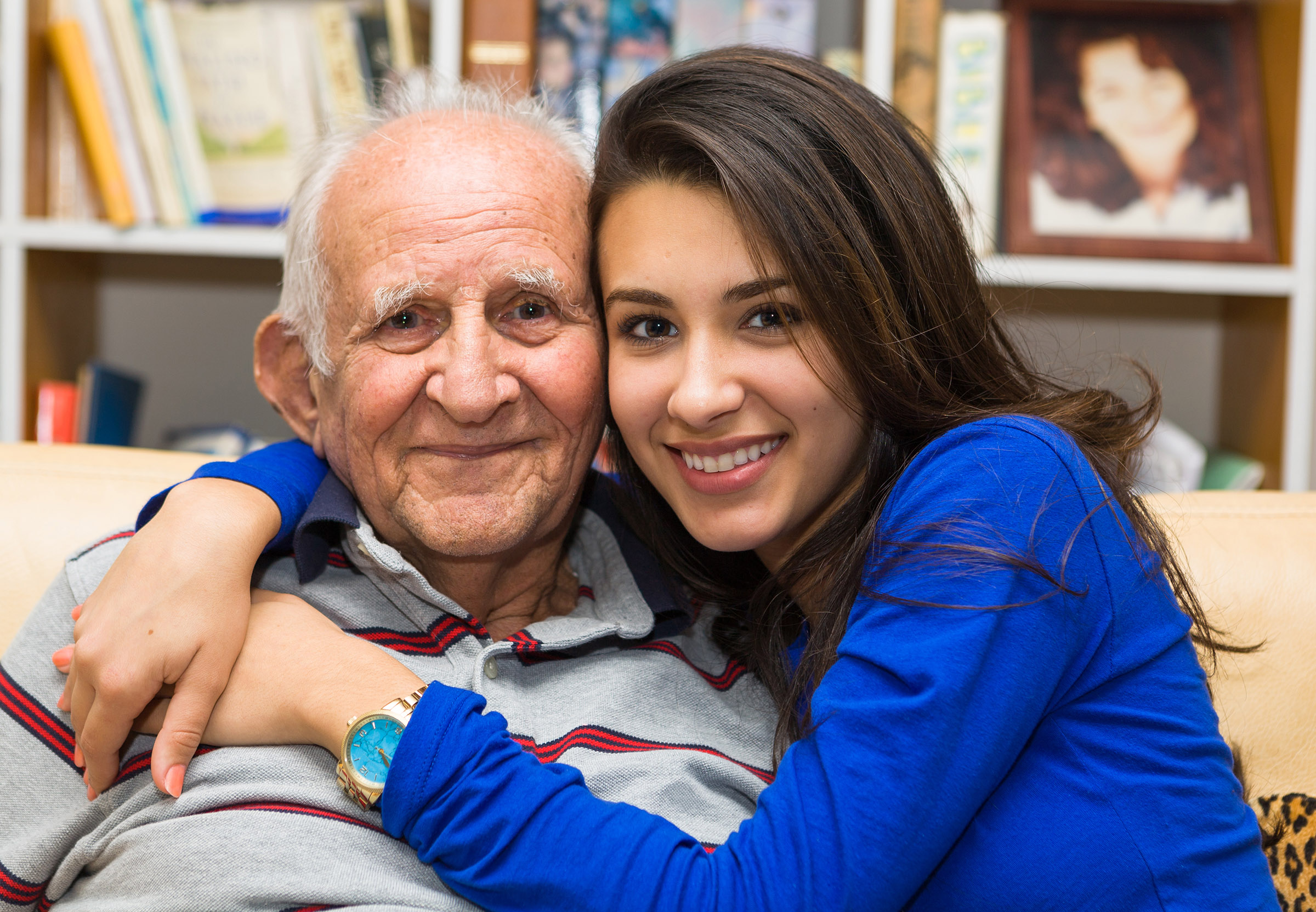Notes for a Carer
Introduction
The Oesophageal Patients Association is a charity dedicated to supporting patients, families and their carers – when preparing for, undergoing, and surviving after surgery for oesophageal cancer.
Our meetings and publications (including a bi-yearly newsletter, and downloads from our website) provide a forum and an information site which we hope may help patients, and their carers, live better after receiving treatment to deal with cancer of the oesophagus. The Association itself has produced five booklets which can be read and/or downloaded from our website, or a hard copy can be sent out to you when you place an order from the OPA Shop.
We also operate a Helpline for Patients,Carers & their families on 0121 704 9860 (9 am – 3 pm, Mon – Fri), to help direct you to the most relevant sources of specialist advice.
Publications
1. A Guide to Life After Oesophageal/Gastric Surgery.
We hope this bookletmay be helpful for carers as well as for patients who are preparing to undergo, or who have undergone, this major surgical operation. It gives a general overview of the nature of the surgery itself, of post-operative recovery, and then of the possible or likely changes to a patient’s general lifestyle – especially to the inevitable changes to eating and drinking – and also to some of the associated problems that may arise. To view a PDF version of this booklet, click here.
2. Swallowing & Nutrition – when it’s difficult.
This booklet goes into greater detail concerning some of the complications around eating and general nutrition that may arise after the operation. It covers issues around the effects of having radiation or chemotherapy, of possibly later having to have a stent fitted, and the complications that may arise with certain foods in these circumstances. It also gives quite detailed advice about balancing the diet of a post-operative patient in the longer term, paying attention to energy, protein, and vitamin and mineral requirements, with sections on simple foods that are especially nutritious, and on food supplements that can be beneficial. Finally it gives advice on some of the problems that can occasionally arise, such as indigestion, nausea, diarrhoea, or loss of appetite. To view a PDF version of this booklet, click here.
3. Recipes for When Food is a Problem.
This is a recipe book with various food ideas for people who need to put on weight, have difficulty in swallowing, or who are living with the after-effects of surgery on the stomach and/or oesophagus (gullet). To view a PDF version of this booklet, click here.
4. Oesophagogastric Cancer – The Patient’s Pathway.
This booklet is a pathway guide for patients following diagnosis. It is based on the St Thomas’ Hospital (London) pathway but as the treatment is standardised across the UK, it should reflect that in the centre where you are treated. To view a PDF version of this booklet, click here.
Being a Carer
Being a carer is a commitment, one might also say a job, without a fixed definition – and often, unfortunately, without extra financial support. Not unlike some aspects of the role of doctor or nurse, here it means focussing on the recovery, survival and well-being of your partner or friend. He or she may need your support and help after such a life event that a diagnosis of serious or life-threatening ill-health has brought about.
In the role of carer, it is important not to underestimate anxieties or worries which your partner or friend may have on occasions where fresh complications, or a new pain, arises; worries that the cancer could, or has, returned. After treatment for cancer, every such occurrence can trigger these worries, and therefore if such a new pain or complication arises, it is advisable to make an appointment with the doctor or specialist nurse to have it looked into as soon as possible. (Avoid – as I am sure you will have learnt – well-meaning reassurances that ‘don’t worry just now’, or ‘it will get better soon’, etc.)
As your partner or friend doubtless, and possibly you yourself, will also have learnt from the doctors and nurses after the operation and treatment, there are many possible side-effects and consequences of treatment for oesophageal cancer, and several of these are explained in our booklet described, ‘A Guide to Life After …’. It is always recommended that you try to be present at any subsequent follow-up consultations of your partner or friend with his or her consultant or specialist nurse. You may have helped him or her prepare for the consultation, making notes for what he or she, or you yourself, wish to report or discuss. If he or she is anxious or distressed, you can give extra support, and possibly take notes on the comments and advice that the consultant or specialist nurse gives.
If the patient needs to see his or her GP in an emergency, please remember that – with the responsibilities that GPs carry to cover the conditions of every one of their surgery’s patients – the GP may not be fully familiar with the very particular nature of complications arising from oesophageal cancer. A visit to that GP may therefore be only the initial step for a further referral to the local consultant or specialist nurse.
After the operation, it is possible that some swallowing difficulties may develop again, and its is important to report these as soon as possible. All that may be needed is a ‘stretch’ under endoscopy (see ‘Time for a stretch?’ in our January 2014 newsletter, but any such difficulties should be reported and reviewed in all instances. Other more common consequences of the treatment are ‘Dumping syndrome’, ‘Steatorrhea (malabsorption)’ and ‘SIBO (small intestinal bacterial overgrowth)’. These are explained in greater detail in our factsheets – especially in ‘Nutrition and digestive issues’, and in some of our newsletters.
Our Association has many OPA-affiliated groups round the country, as well as contacts with other groups set up on independent initiatives. We can provide patients and carers with information on how to contact these, as making and maintaining contact with one in your locality offers a valuable and often much appreciated opportunity to meet, and to exchange information and experiences, with others in similar circumstances.
Resources
The Association’s factsheets and past newsletters, which are available on our website, may contain items of interest, for example:
Newsletters
- ‘Glossary of relevant medical terminology’ (Autumn 2011)
- ‘Symptoms of [oesophageal] cancer’ (December 2015)
- ‘Optimal steps for preparing for surgery’ (Spring 2016)
- ‘Top tips for patients preparing for an interview with the doctor/surgeon’ (Spring 2011)
- ‘A day in the life of a carer’ (December 2016)
- ‘What is Dumping Syndrome’ (Autumn 2012), ‘Vagus [nerves]’ & ‘Dumping Syndrome’ (Autumn 2011). These may be read in conjunction with the greater detail given in our booklet ‘Swallowing & Nutrition – When it’s difficult’
- ‘Increasing calorie content of existing meals and snacks’ (December 2015)
- ‘10 ways with Nutritional Supplements [e.g. Fortisips, Complan, etc.]’ (Autumn 2010)
- ‘Medication: drugs; what they do … (Spring 2012)
- ‘Fatigue – a forgotten symptom’ (Autumn 2013)
- ‘If you have a stent fitted’ (Autumn 2012)
Many of our newsletters also contain moving and reassuring first-hand accounts by patients of their pathway through surgery to recovery.
There are also some food suggestions:
- Menus for meals (Spring 2012)
- Easy fish pie (May 2015)
- Sweet potato soup (Spring 2016)
Factsheets
- ‘Nutrition and digestive issues’
- ‘Dumping syndrome and digestion problems after surgery’
- ‘Dumping syndrome and low Glycaemic Index foods’
- ‘Post-operative exercising’
- ‘Relaxation’
Useful information
Websites
Several other excellent sources and resources for carers which can offer assistance might be of interest:
Macmillan Forum Page
More generally, the website ‘Macmillan.org.uk’ offers very useful information and advice on many aspects of oesophageal cancer, its treatments and survival in a 135-page booklet, which is available in PDF format, downloadable, and also as a CD.
Carersuk.org offers an online forum of people who may well have experienced what you, as a carer, are going through. It can be reassuring to hear others’ stories and opinions, and to share yours with them.
Carers Direct is an NHS helpline on 0300 123 1053, for anyone needing help with their caring role, and with discovering what options are available to them. It covers ground similar to those publications and online sources found at Macmillan and Age UK.
Carerstrust is a charity which “works to improve support, services and recognition for anyone living with the challenges of caring, unpaid, for a family member or friend …”. It offers online services, grants in some instances, and a network of independent partners who can assist carers “to get the extra help they need to live their own lives”.
Corecharity.org.uk is a charity which undertakes research on all digestive diseases (gut, liver and pancreas). It also publishes a regular newsletter. If there are children in the family, affected by the parent’s cancer, extra advice is available on the websites ‘Cancer.org’, ‘Cancerresearchuk.org’ as well as on the Macmillan site.
Carers are advised to ask to register as a carer with their local GP surgery as a precautionary measure, in case of an emergency.
Possibilities for financial support for carers
(with thanks to Age UK’s research and information services)
Age UK’s website offers the following in booklet form or as online downloads:
- What is Carer’s Allowance?
- Who can claim Carer’s Allowance?
- How to claim Carer’s Allowance
- Help claiming Carer’s Allowance
- Information for Carers
- Attendance Allowance
What is carer’s allowance?
Age UK’s website explains “… it’s worth £62.70p* per week, if eligible. You don’t have to be related to, or live with, the person you are caring for to claim Carer’s Allowance. You’ll also get National Insurance credits each week towards your pension, if you’re under pension age.
The eligibility rules are as follows. You need:
- To spend at least 35 hours a week caring for a disabled person
- To care for someone who receives the highest or middle rate of Disability Living Allowance [DLA], either rate of Personal Independence Payment [PIP] daily living component, or any rate of Attendance Allowance,
- Not to earn more than £110* a week (after deductions)
- Not to be in full-time education
Carer’s Allowance may not be paid if you’re receiving a State Pension or certainother benefits, but it’s still worth claiming because you could get extra Pension Credit and/or Housing Benefit. Extra conditions would apply if you’re claiming Universal Credit.
How to claim Carer’s Allowance: call the Carer’s Allowance Unit on 0800 731 0297 (textphone 0800 731 0317) to request a claim pack. Or you can visit the website GOV.UK to download a claim form or make a claim online.
Age UK has published the following booklets as well, which are also available as online downloads:
- Advice for Carers,
- Carer’s Allowance information guide,
- Carer’s Allowance factsheet,
- A guide to claiming benefits for people over pension age.
Advice for Carers
In accordance with Age UK’s advice “… looks at both the practical side of caring – the benefits you can claim, how to arrange flexible working hours, how to organise respite care – and the emotional side, such as the impact on your health and social life. This may include assistance for you and the person you are caring for from your local council’s Social Services, beginning with a free Carer’s Assessment. It aims to let you know where to go for help, so you don’t feel you have to manage on your own.”
It also gives advice on helping the person you are caring for with their application for benefits to which they may be entitled.
Carer’s Allowance information guide
Age UK’s information guide, which “… gives answers to a number of frequently asked questions, such as ‘Am I a carer?’, ‘What happens if I’m receiving State Pension?, ‘What if my application is turned down?” and several more in a similar vein.
Carer’s Allowance factsheet
Age UK’s Carer’s Allowance factsheet sets out “… what the allowance is, the eligibility criteria and how to make a claim. It also explains how Carer’s Allowance may impact on any other benefits you, or the person you are caring for, are receiving, and what to do if you have a change of circumstance.”
**Note that these criteria and rules may change every [budget] year [i.e. April to March], or even during the year, so it is worth checking these at the GOV.UK website.
‘More money in your pocket’: a guide to claiming benefits for people over pension age
Age UK’s guide advises… “If you’re 60 or over, you could be entitled to benefits that you haven’t been able to claim before. These can help you keep your independence and improve your standard of living by helping with housing costs, care needs or general day-to-day living expenses … Age UK’s online benefit calculator can help you work out what you may be entitled to ….”. This calculator is straightforward to use, and can help to give initial guidance as to whether you are entitled to claim, and if you are, an idea of the amount.
Carers may also like to look into the possibility of claiming Attendance Allowance for the person for whom they are caring.
Age UK’s guide explains that this allowance is for over-65’s with physical or mental disability, who need help with daily living, and who are not already in receipt of Disability Living Allowance [DLA] or Personal Independence Payment [PIP]. The allowance is tax-free and not means-tested, and available to all who are eligible, regardless of current income or savings.
To apply, they will have needed help for at least the previous six months or, if they are terminally ill, they can make a claim straight away. If they are awarded Attendance Allowance, they may become entitled to other benefits, such as Pension Credit, Housing Benefit, or Council Tax Reduction. www.ageuk.org.uk/
All content, medical text and information booklets on this website are copyright of the Oesophageal Patients Association. Please contact us for permission if you wish to reproduce any content.
© Oesophageal Patients Association



